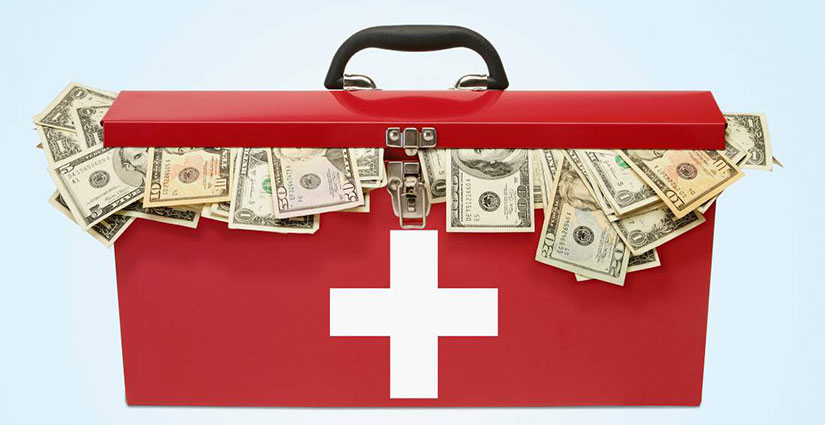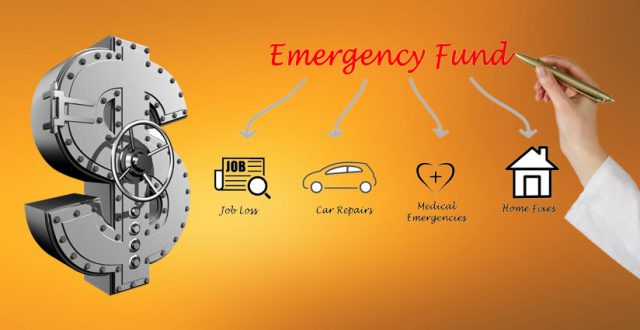Emergency savings popularly known as “oh shit fund”, is a fund that most often we neglect or overlook unseeing the varsity of life.
When you lead a fast paced lifestyle, or just a conventional one, you may come across some of the not so common expenses that may affect your financial world quite significantly. Usually, when you aren’t prepared that is when you are bombarded with an unexpected expense. But, guess what being prepared isn’t a herculean task whatsoever; it takes almost no mental effort and hopefully no physical effort. You just ought to have a plan.
You should have an emergency fund set aside that you never touch except in complete emergency. What if you get laid off or pay for an unexpected life saving surgery. Sometimes abstract. If it’s not important enough then don’t touch it. Financial experts always talk about setting aside money for an emergency fund. It’s become clichéd wisdom that you must have an emergency fund or rainy day fund. While an emergency fund may be a great thing to have, it can seem either scary or pointless by those people who may still have debt. Various finance guru’s recommend 3 – 6 months of expenses in an emergency fund which sounds like the most daunting job on planet Earth.
If you’re under the impression you don’t need any savings, you’re thoroughly mistaken. It’s easy and simple. You must assume that developing a small nest egg is even more significant than paying off debt, because being prepared is the best way to thwart off an increase in your debt. While you require 3-6 months worth, you ought to reasonably calculate all of the things imagine that could go wrong in your life and how much would they cost.
Once your emergency savings passes whatever threshold you determine is essential to prevent yourself and start saving your hear earned money.

Ways to get started an Emergency Fund
– Request a rate reduction on your credit cards: If you are carrying a credit card balance, getting your interest rate decreased may directly save you money each month. Just flip over your credit card, call the number on the back, ask to speak to a supervisor, and request that the rate be decreased. Recommend considering transferring your balance off the card.
– Put it in a grocery list for shopping: Few minutes of sitting down and making a list of all the essentials before you hit the road will save you at least 10 minutes in the store; along with that it will also help you stay focus on the stuff you actually need, decreasing your grocery bill as you are putting less unnecessary stuff in the cart.
– Avoid expensive meals, even if that’s once in a month: Instead of going out for expensive dinners, try to catch up with your loved ones at the luxury of your own place. You’ll save quiet even if you prepare something very fancy in your own kitchen.
– Choose Carpool: Find a person living in near proximity from your place and works at the same place firm as you. Even if you can only do it a few days a week, you’ll still cut down on your commute costs, plus it will be a lot harder to stop for those impulse splurges.
– Use public transportation: Even better, get in the habit of using public transportation for your commuting needs. Most metropolitan areas have surprisingly good public transportation options – and they’re far cheaper (and not all that much more time consuming) than driving yourself.
– Go green by using cycle: Bit heavy on weight and want to get in shape? Not far away from your work station either? A perfect situation to get a cycle and start using it for the commute instead of wasting your hard earned money on fuel and car maintenance.
– Trim unnecessary monthly bills: Try to reduce unnecessary bills by for seeing the monthly expenses at large.
– Snowflake: Often we see people come into a bit of unexpected money, they tend to spend it sans analyzing the expense. They feel instead of spending “found money”, take some or all of it and thereby drop it into your emergency fund. If you have online banking, that’s quite easy- just transfer it out of your checking account.
Peace of mind can be a powerful force, and if it’s the key impetus for you to save and pay off debt perhaps having money readily available can only help to ease your mind. It is important that having cash in hand for any emergency trumps the necessity to pay down debt. There are plenty of uncertainties in life, and there’s an apparent reason why emergency funds are so strongly advocated. You must stick to a “minimum balance only” plan until you have sufficient money in hand to make yourself self sufficient.
Once you hit your “magic number”, as far as emergency savings goes, then you either go down one of two roads: If you’re in debt, you start paying them off (highest interest rate to lowest). If you’re debt-free, you start investing. Use the time when you’re building up your emergency fund and paying down to learn how to invest.
Owning a real emergency fund is a pretty intimidating thing because it is a solid acknowledgment of the known fact that the world we live in is, at its essence totally unpredictable and out of control. And this spans every single aspect of our lives- even the things we cherish most close to our heart. It’s horrifying. And having the emergency fund as a real emergency fund is an intentional acceptance of it.
It is difficult to budget every single curve ball that life throws our way. Some are real gentle and simple to nail but others can be some sharper ones that are much harder to nail.
You know, we really can’t budget for every single curve ball life throws our way. Some are real gentle and easy to nail but others can be some sharper ones that are much harder to nail. But just because the sharper curve balls cause some sort of unpleasantness in our lives doesn’t qualify it as a real emergency.
Different people have a lot of different saving methods. Some people have targeted savings accounts. Some people have plethora of saving tools in place for various different methods. And they are quite cool and must definitely think about something that works for you. Just leave the emergency fund alone.
Here’s a thing forget the emergency fund or the true “Oh Shit!” moments in your life nevertheless have another fund in place for the Dimmit” moments too, because those happen way more often in your life than the others do.
Conclusion
In the end, it’s simple to say you ought to have an emergency fund, but getting into action especially if your budget is small and you need every buck, is quite difficult. Another imperative thing is that you are trying to save for future goals like retirement or a down payment on a home, or you are working to pay off working on an emergency fund might not just be on your top priority.






























































